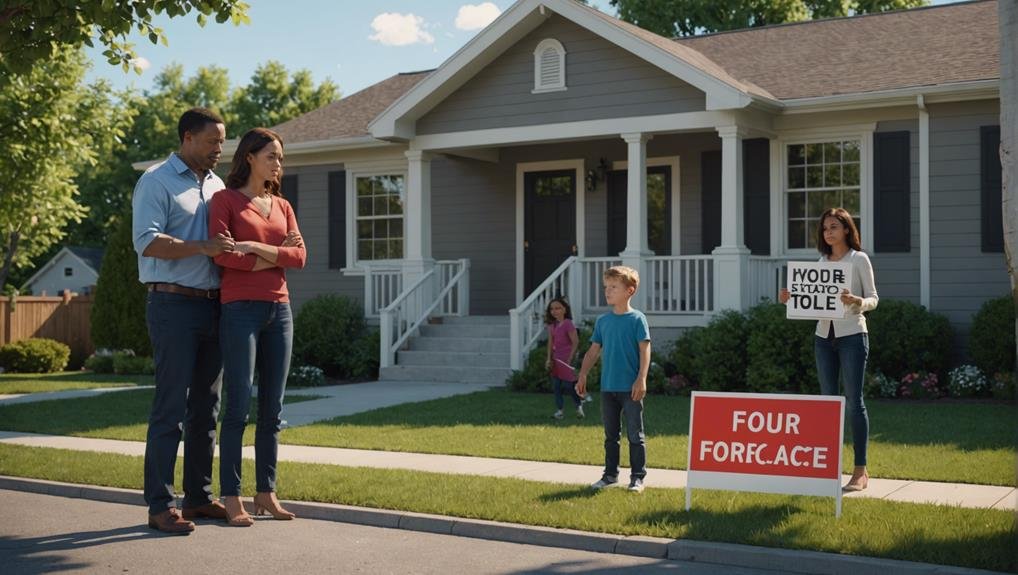Foreclosure Unveiled: Process, Risks, and Solutions
Foreclosure involves reclaiming property due to mortgage default, with a national average duration of 857 days. Risks include financial loss, credit damage, and legal battles, impacting future stability. Laws vary by state, affecting timelines and processes with judicial and nonjudicial procedures. Understanding state-specific laws is essential. Foreclosed properties averaged 922 days in Q2 2021, with Hawaii having the longest duration. Alternatives like financial counseling and loan modification aim to prevent dire consequences. The intricate world of foreclosure encases legal complexities, financial risks, and potential solutions, shaping a landscape impacting both parties involved.
Key Takeaways
- Foreclosure is a legal process due to mortgage default, impacting credit for 7 years.
- Homeowners face financial losses, credit damage, and limited future housing options.
- State laws govern foreclosure procedures, impacting timelines and legal requirements.
- Alternatives like financial counseling and loan modification can prevent foreclosure consequences.
- Understanding state-specific laws is crucial for navigating foreclosure effectively.
Overview of Foreclosure Process
The foreclosure process is a meticulously regulated legal procedure through which a lender reclaims ownership of a property due to a borrower's default on a mortgage. The foreclosure timeline can vary greatly, with the national average duration being 857 days. However, specific state laws and processes influence the length of the foreclosure proceedings, with Hawaii having the longest duration at 3,068 days.
Foreclosure implications are severe, impacting the borrower's credit report for seven years. Different states have varying laws governing foreclosures, with some requiring court approval (judicial foreclosure) and others proceeding without court involvement (nonjudicial foreclosure). Understanding the intricacies of the foreclosure process and seeking alternatives early can help mitigate the consequences for both borrowers and lenders.
Risks Associated With Foreclosure
Analyzing the potential consequences of foreclosure reveals a myriad of risks that impact both borrowers and lenders in the real estate market.
- Financial implications:
- Foreclosure can result in significant financial losses for homeowners, including the loss of equity and damage to credit scores.
- Homeowner rights:
- Homeowners have certain rights during the foreclosure process, such as the right to be informed about the proceedings and the opportunity to explore alternatives to foreclosure.
- Legal ramifications:
- Foreclosure can lead to legal battles between borrowers and lenders, involving court proceedings and potential challenges to the foreclosure action.
- Long-term impact:
- The effects of foreclosure can extend beyond the immediate loss of property, affecting future housing opportunities and financial stability for both parties involved.
State Laws and Foreclosure Variations
Upon facing foreclosure, understanding the nuances of state laws and the variations in foreclosure processes becomes essential for both borrowers and lenders traversing the complex real estate market landscape. State laws govern foreclosures, dictating public notices, borrower options, and property sale procedures.
Judicial foreclosure, requiring court approval, is prevalent in 22 states, while nonjudicial foreclosure, faster and court-free, is common in 28 states. The lender may auction the property or opt for a traditional sale to recover losses. These variations have a notable impact on the foreclosure timeline and the overall process, showcasing the importance of being well-versed in state-specific laws to navigate the foreclosure landscape effectively.
Staying informed about foreclosure trends is vital for all parties involved.
Duration and Statistics on Foreclosure
An examination of the duration and statistical trends in foreclosure processes reveals significant insights into the real estate market's complexities and challenges.
Duration and Statistics on Foreclosure:
- Average Timelines:
- The second quarter of 2021 saw foreclosed properties spending an average of 922 days in the process.
- State Comparisons:
- Hawaii holds the record for the longest foreclosure duration at 3,068 days.
- States like Wyoming, Arkansas, and Tennessee have shorter average foreclosure times.
- Fluctuations:
- Timelines vary due to distinct state laws and processes.
- Historical Data:
- Changes in average days to foreclosure have been observed since 2007, indicating evolving trends in the foreclosure landscape.
Alternatives to Foreclosure
Examining ways to navigate financial challenges in the real estate market, exploring alternatives to foreclosure becomes imperative for both lenders and borrowers facing potential default scenarios. Two key alternatives to foreclosure include financial counseling and loan modification. Financial counseling provides borrowers with expert advice on managing finances and exploring options to avoid foreclosure. On the other hand, loan modification involves changing the terms of the existing loan to make payments more manageable for the borrower, potentially preventing foreclosure. These alternatives aim to assist individuals in financial distress by providing guidance and restructuring loan terms to avoid the significant consequences of foreclosure.
| Alternatives to Foreclosure | Description |
|---|---|
| Financial Counseling | Expert guidance on finances |
| Loan Modification | Adjusting loan terms for ease |
Impact of Foreclosure on Credit
Understanding the repercussions of foreclosure on an individual's credit profile is essential for grasping the long-term financial implications of defaulting on a mortgage. When a borrower faces foreclosure, it can have a substantial impact on their creditworthiness and financial future. Here are key points regarding the credit implications and financial planning considerations:
- Credit Score Impact: Foreclosure can lower credit scores by 100 points or more, making it challenging to obtain credit in the future.
- Credit Report: The foreclosure remains on the credit report for seven years, affecting the borrower's ability to secure favorable loan terms.
- Financial Planning: Developing a post-foreclosure financial plan is vital to rebuilding credit and regaining financial stability.
- Debt Management: Seeking professional advice for debt management and credit repair can help navigate the aftermath of foreclosure effectively.
Additional Foreclosure Concepts
Foreclosure concepts extend beyond credit impacts to encompass various legal, financial, and property-related aspects that shape the foreclosure process and its outcomes.
Non-REO Foreclosure is a process where the lender does not acquire the property, differing from real estate-owned foreclosure where the lender takes ownership.
Understanding Mortgage Types is vital as they include fixed-rate and adjustable-rate mortgages, impacting repayment terms and foreclosure risks.
Differentiating between Non-REO and REO Foreclosure is essential for borrowers and lenders to navigate the complexities of property ownership post-foreclosure.
Recognizing the nuances of these concepts can assist individuals in making informed decisions regarding their mortgage agreements and potential foreclosure scenarios, enhancing their overall financial literacy and preparedness.
Conclusion
In the intricate dance of foreclosure, the legal mechanisms and state laws govern the reclaiming of defaulted loans through mortgaged properties. Understanding the risks, variations, and alternatives can help navigate this complex process.
Like a labyrinth, foreclosure presents challenges and potential solutions, ultimately reshaping the landscape of real estate transactions.







